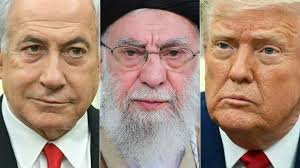In a surprise announcement that sent shockwaves across the global political landscape, former U.S. President Donald Trump declared that an Israel Iran ceasefire is now in effect. The statement comes amid weeks of heightened military confrontations, missile strikes, and growing fears of a full-scale regional conflict.
Though yet to be confirmed by both Israeli and Iranian officials, Trump’s claim has fueled speculation about behind-the-scenes negotiations and the possibility of a fragile halt to hostilities.
Background of the Israel Iran Conflict
Timeline of Recent Tensions
The latest escalation between Israel and Iran has its roots in long-standing political, military, and ideological rivalries. Over recent months, reports of drone attacks, cyber warfare, and direct military strikes have dominated headlines.
Israel has accused Iran of supporting proxy groups along its borders, while Iran has condemned Israeli airstrikes on its military assets in Syria and other regions. This tit-for-tat exchange pushed the two nations to the brink, raising alarm across the international community.
Global Concern Over Regional Stability
The risk of direct war between Israel and Iran has been a nightmare scenario for global leaders. A broader conflict threatens vital oil routes, and global trade, and could destabilize the Middle East entirely.
Amid this backdrop, the announcement of an Israel Iran ceasefire is being viewed as a crucial—albeit tentative—development.
The Israel Iran Ceasefire Announcement
Trump’s Statement and Its Implications
Speaking at a press event in Florida, Donald Trump declared, “The Israel-Iran ceasefire is in place. I’ve spoken to sources on both sides. It’s happening.”
The statement sparked immediate reactions worldwide. While Trump did not clarify the nature of his sources or involvement in negotiations, his words have intensified scrutiny on ongoing diplomatic efforts.
Israeli and Iranian officials have yet to issue formal confirmations, but there are reports of reduced military activity in disputed areas.
Terms and Conditions of the Ceasefire
While details remain scarce, unconfirmed reports suggest the Israel Iran ceasefire involves halting airstrikes, drone attacks, and cross-border aggression. Third-party mediators, possibly Qatar or Oman, are believed to be facilitating behind-the-scenes negotiations.
The ceasefire’s longevity, however, depends on both sides adhering to these informal understandings.
Global Reactions to the Israel Iran Ceasefire
Political Leaders and Diplomats Respond
Governments worldwide have cautiously welcomed the news. The European Union issued a statement urging both sides to “seize the moment for de-escalation.” Meanwhile, leaders from Russia and China have expressed support for any diplomatic breakthroughs that prevent wider conflict.
U.S. officials, while distancing themselves from Trump’s claim, acknowledged that efforts to establish an Israel Iran ceasefire are ongoing behind closed doors.
Media Coverage and Public Opinion
Major news outlets are treating the announcement with cautious optimism. Social media has been flooded with discussions, with hashtags like #IsraelIranCeasefire trending globally. Analysts remain divided on whether this is a genuine breakthrough or premature speculation.
The Reality on the Ground
Reports of Ongoing Tensions or Compliance
In the hours following Trump’s statement, military activity along Israel’s northern borders and in key strategic locations reportedly decreased. However, sporadic clashes involving proxy groups continue to be reported, highlighting the fragile nature of the Israel Iran ceasefire.
Observers on the ground have yet to confirm a total cessation of hostilities.
Humanitarian Impact and Civilian Situation
Civilians in affected areas, particularly in Lebanon, Syria, and parts of Israel, have expressed relief at the prospect of reduced violence. Humanitarian agencies are mobilizing to assist communities caught in the crossfire, with the hope that a sustained Israel Iran ceasefire will allow for aid delivery and rebuilding efforts.
Future Outlook for Israel Iran Relations
Potential for Lasting Peace or Renewed Conflict
While the ceasefire, if confirmed, offers hope, history suggests caution. Previous agreements have often collapsed due to political mistrust, rogue factions, and unresolved core disputes.
Experts warn that without direct, transparent negotiations, the Israel Iran ceasefire could be temporary.
Role of Global Powers in Sustaining the Ceasefire
The international community’s role is critical in stabilizing the situation. The U.S., European Union, and regional actors like Turkey and Saudi Arabia are expected to apply diplomatic pressure to maintain peace.
Mediation by neutral parties, coupled with confidence-building measures, will be essential for turning this ceasefire into a lasting agreement.
Conclusion
The announcement of an Israel Iran ceasefire, as stated by Donald Trump, marks a significant—if uncertain—moment in Middle Eastern geopolitics. While many welcome the news, skepticism remains given the volatile history between the two nations.
As global leaders and mediators work behind the scenes, the world watches closely to see if this fragile peace holds or if the region will once again slip toward conflict.
Never Miss a Beat! Subscribe for the Latest News & Exclusive Updates!
